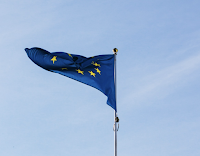By Jonathan Larson, Associate Director of the EU Center
November 2021
As the Illinois EU Center entered the third and final year of its 2018-21 grant from the European Commission to serve as a Jean Monnet Center of Excellence, it directed attention somewhat from the second year’s discussions about EU enlargement and regional tensions toward questions of gender and populism that formed one of the other key axes of the original proposal. The year also offered the opportunity to dig a little deeper into historical bases for a common European identity and some of the race-based notions of difference and even exclusion at its core. The center took advantage of increased access to speakers in virtual events and leaned more deeply into an exploration of European legislative careers through a new course and speaker series. It also resumed with new touches its long-running EU Studies Conference, including a roundtable on new directions in EU studies. As the center closed out the year and entered a short two-month extension of the grant for September and October 2021, it opened new chapters in its engagements with different European countries and institutions.
Political scientist Philip Ayoub helped us open the year with a keynote offered at our September 2020 fall reception, “When States Come Out: Transnational Movements & the Diffusion of LGBTI Rights in Europe.” Swedish Ambassador to the US Karin Olofsdotter spoke to us about "Rights, Representation, and Resources: Gender Equality in Sweden and the EU" (while also becoming the first woman to deliver an EU Day keynote address for the center). This work around populism and the roots of the social production of difference in European space informed updates to students’ resources on the topic available through the U of I library, as well as an innovative virtual book exhibit on populism and gender (to be formally launched in November 2021) — an adaptation of a U of I library tradition in response to the pandemic.
The center continued the historical turn that it began in April 2020 in looking for perspectives to make sense of a present disrupted unexpectedly by the COVID-19 pandemic. KU Leuven historian Patrick Pasture offered a broader historical view on dynamics of inclusion and exclusion with his talk, “‘Tolerance is the Soul of Europe’: Christendom, Religious (In)Tolerance and the Birth of Europe.” U of I Professor of English Andrea Stevens shared an insightful view on the history of performance and ideas of race with a brown bag lecture “Blackface Disguise at the Court of Queen Henrietta Maria, 1625-1649.” Several faculty in the humanities, including EU Center Director Emanuel Rota, joined together around a project on race in the Mediterranean, competing successfully for a Thomas Jefferson grant from the French Embassy to the US. JMCE grant key faculty Zsuzsanna Fagyal joined a virtual monthly panel series organized by our peer center at the University of Pittsburgh on “Cementing the Boundaries of Frenchness.” The center also organized, as a collaboration with two other universities with Jean Monnet grants, a March 2021 symposium “Race, Human Rights, and Populism in Poland.”
A further new initiative was a speaker series integrated into a pilot course, The Everyday Making of the European Parliament and Parliamentarians. The course was part of a larger move the EU Center is making to draw students to the study of the EU from disciplines outside the field’s historical core in political science. The course drew from a body of work by anthropologists and sociologists who have employed ethnographic methods to study institutions such as the European Parliament or European Commission. Informed by this literature, students met with five different Former Members of the European Parliament to learn about their experience of it as an institution, also in comparison with other professional experience. The course culminated in a three-week virtual exchange with a course from the University of Vienna on the politics of Austria and the European Union and a common meeting with Austrian journalist and Former Member Eugen Freund. Students on both sides found this common experience, and exposure to each side’s questions, to be a highlight of their respective courses’ explorations of aspects of the EU. MAEUS students wrote blog posts on Bulgarian Former MEP Georgi Pirinski and on British Former MEP Rory Palmer.
Approaching the end of the academic year the EU Center hosted its renamed Illinois EU Studies Conference in a virtual format for the first time and gave it a theme: “Community, Immunity, and the Limits of Mobility.” The format encouraged wider advertising of this multi-day event as a contribution from the U of I to the field of EU Studies. Saving on travel costs allowed the EUC to feature two invited panels with scholars from different disciplines outside the US as well as a closing roundtable on next directions in EU Studies, featuring the 2020 winners of the Larry Neal Prize for the edited volume, The European Union and Beyond: Multi-Level Governance, Institutions, and Policy-Making.
Over the summer of 2021 the EU Center requested and received a two-month extension on its 2018-21 JMCE grant, in part to extend discussions about strategic collaborations with a small set of European partners, including the French, German, and Italian consulates in Chicago, as well as the Technical University of Vienna and University of Strasbourg. As we proceed further into a post-pandemic and potentially receding populist world, lessons from immobility (such as the necessity of virtual engagements) are informing how we collaborate (not to mention the essentially transnational nature of so many regional challenges and seeds for solutions). Among these regionally articulated common challenges are environmental and social sustainability. In what ways technologies can be adapted and adopted to face these challenges is a topic that the EU Center is looking forward to exploring as it wraps up its current JMCE grant and proceeds further into the 2021-22 academic year.

Comments
Post a Comment